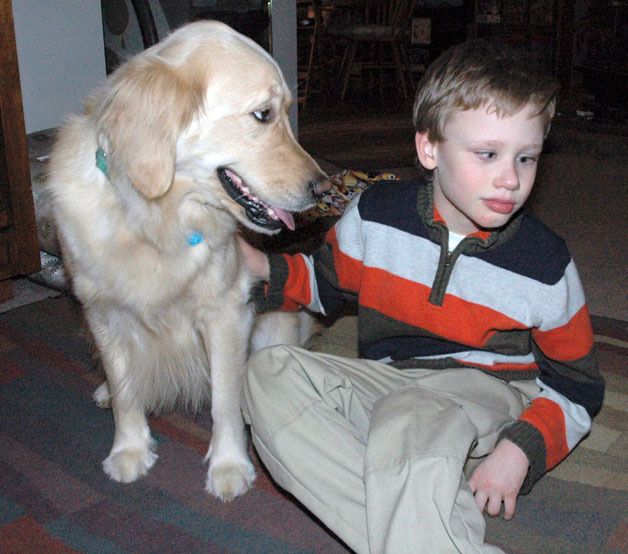MARYSVILLE — For most of his life, Christopher Wells has been trapped in his own body, but over the course of the past years a four-legged friend named Campbell has helped him connect to the outside world.
Christopher suffered a severe brain hemorrhage while he was still in his mother Christine’s womb, and his premature birth left him unable to walk, talk or feed himself, with almost nonexistent vision.
Although Christopher is cognitively aware, his inability to communicate often leaves him frustrated, which used to cause him to bang his head against the wall or floor or other hard surfaces.
“Even in one of my favorite photos of my two kids, Christopher’s poor forehead is all bruised,” Christine Wells said. “He’s 8 years old, but the doctors say he has a gestational age of 6-9 months. I’ve seen his sister, who’s 14 months younger than him, shoot past him on all their developmental milestones, and my heart just breaks for him.”
While other forms of therapy seemed to have little effect, the Wells family found what they deemed their salvation from Summit Assistance Dogs in Anacortes, who supplied them with a therapy dog, after a rigorous training and screening process to ensure that the dog in question would meet Christopher’s unique needs.
“We first met Campbell last year, after an exhaustive process and a lot of interviews,” Christine Wells said of the two-and-a-half-year-old Golden Retriever. “A lot of the dogs couldn’t deal with Christopher, but when he started screaming, she just reacted like, ‘Okay, so what next?’ His behavior didn’t have a negative effect on her at all, but she was concerned with him. She loves to take care of him.”
Summit dogs receive basic training from puppy raisers until they’re 16-18 months old, after which Summit staff trainers take over for an additional four to eight months. Campbell’s age is typical for Summit therapy dogs, who are generally placed with applicants when they’re around 2 years old. According to Sue Meinzinger, Summit’s founder and executive director, their dogs are trained through positive reinforcement — with food, praise and play — to shape their desired behaviors.
“She came from Chuckanut Retrievers in Bellingham, and her training included a program at the Monroe Prison, where inmates learned to work with her, as well as several foster homes, all of which drilled a whole series of cues and commands into her,” Christine Wells said. “I couldn’t afford to try and train her. I’m a single mom, and my primary income is Supplemental Security Income for Christopher. Our family’s income is 150 percent below poverty level.”
The Welles family is so grateful to Summit for Campbell and the program. Although Summit doesn’t charge its applicants for their dogs, the cost of raising and training just one service dog, for about two years, is approximately $25,000, when coupled with the expenses of providing lifetime follow-up care to the clients.
Christopher and Campbell’s partnership wasn’t officially recognized until Summit’s annual graduation ceremony for its dogs and their clients on Sunday, Jan. 12, in Bellevue, during which Christine served as the guest speaker on behalf of all eight graduate teams. In the meantime, though, Christine has seen Christopher’s head-banging cease almost entirely, and his engagement with the world around him gradually go up.
“Prior to a year ago, music was the only thing that interested him,” Christine Wells said. “Now, he’ll sit in front of the TV and respond to the shows. He’s completely blind in his left eye, but he has a pinhole of peripheral vision in his right eye, and you can see him turning his head to try and catch sight of what’s on the screen. He can say ‘Mom’ and ‘yeah’ now, and one morning, I even heard him banging his drum set in time with the song ‘Little Drummer Boy.’ It just filled me with joy.”
To watch Christopher and Campbell interact might seem like little more than play, but when Christopher makes noises of distress and starts slapping the floor, Campbell soothes him by nuzzling against him and showering him in “dog kisses,” which cause Christopher to break out into fits of giggles and roll on the floor from side to side contentedly.
“Campbell’s pretty pampered here,” Christine Wells laughed, “but she’s done wonders for Christopher. She has a mind of her own, but she does listen well. She’s so patient with him. It’s such a blessing. He’s slept alone his whole life, but at night, she jumps right into bed with him, and he’s perfectly fine with it. She hears him get agitated, and she rushes right in and gets in his face. She can calm him down because she’s right on his level. He’s not splitting his forehead open anymore, and you can’t put a measure on that. And it’s all thanks to Summit.”
“We at Summit get such great joy from knowing we help change people’s lives,” Meinzinger said. “Our clients who receive our dogs inspire us again and again. We have matched, trained and graduated 74 of these life-changing teams, and we still love what we do.”
Summit Assistance Dogs is a non-profit organization that was founded in 2000 to provide highly skilled mobility hearing and professional therapy dogs for people who are either living with disabilities or in need of the comfort of a therapy dog. For more information, log onto www.summitdogs.org.



